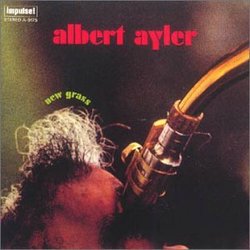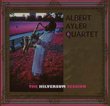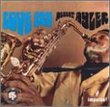| All Artists: Albert Ayler Title: New Grass Members Wishing: 2 Total Copies: 0 Release Date: 1/6/2004 Album Type: Import Genres: Jazz, R&B Styles: Avant Garde & Free Jazz, Soul Number of Discs: 1 SwapaCD Credits: 1 |
Search - Albert Ayler :: New Grass
 | Albert Ayler New Grass Genres: Jazz, R&B
|
Larger Image |
CD DetailsSimilar CDs
|
CD ReviewsPerhaps deserving reevaluation-- nothing like the past. Michael Stack | North Chelmsford, MA USA | 09/16/2005 (4 out of 5 stars) "An album that perhaps deserves reevaluation, Albert Ayler's "New Grass" is often dismissed as a commercial sellout. Stories vary, but its generally believed Impulse! producer Bob Thiele requested Ayler perform with a rock band, and Ayler agreed on the condition that he be allowed to select the band. Still, given the content of the record and the fact that no other Impulse! artists in 1968 were in such a position, it seems highly unlikely that Thiele would make such a request. Jeff Schwartz, in his excellent online biography of Ayler, suggested that Ayler wanted to reach a wider audience with a spiritual message as he felt his time to present such a message was limited. I tend to be inclined to agree with this-- certainly the band Ayler assembled (Call Cobbs on piano, organ and electric harpsichord, Ayler's bassist of the past several years, Bill Folwell, on electric bass, and Bernard Purdie on drums) finds more of an r&b groove, and with an unknown pair of vocalists ("The Soul Singers", consisting of Ayler's girlfriend and songwriting partner Mary Maria and someone named Rose Marie McCoy) and Ayler himself contributing vocals, this isn't exactly a commercial record. So what is it? It's an oddity-- Ayler seems committed to reaching this r&b sound, and certainly the pieces are in r&b form-- his rhythm section excels at this-- Cobb, Folwell and in particular Purdie lock into a tight groove and really sound fantastic, and Ayler, who to some extent grew up with these kinds of sounds around him, digs deep and plays more lyrically and melodically than he ever has. But his playing is still aggressive, forceful, full of overblows, harmonics, and explorations of the altissimo register. And the fact is, if you get over that his music IS so drastically different from how it used to be, his soloing IS fantastic. The vocals are another matter-- the leads, even by Ayler, are decent enough, but I find the backing vocal arrangements (usually chanting-like vocals of choruses and so on) irritating at times. On several songs, this is saved by and large by sweetened up horn arrangements by someone named Bert Decoteaux, which takes the edge off. The best cuts on the record feature catchy r&b melodies, fantastic exploratory playing from Ayler, and a great groove. "New Generation" opens with a fierce tenor solo where Ayler sinks way deep into the r&b groove and never looks back and features probably the best vocal Maria would deliver on the album. "New Ghosts", an r&b rewrite of Ayler's famous "Ghosts" theme is superb-- opening with an oddly treated vocal from Ayler, it then moves into an r&b variant of the great theme, and really it works better than expected. And "Heart Love", while it suffers from totally irritating backing vocals, features a great melody and some superb performances all around. Is it a masterpiece in the way Ayler's earlier records are? Not really, but it is a really good record, and certainly an oddity in his catalog. This reissue puts the CD in a digipack with the original liner notes reproduced, and it benefits from remastering, even moreso than the previous Japanese issue did (in case you had that, the upgrade is worthwhile). In the end, an album deserving reevaluation-- take it for what it is, Ayler playing r&b, and you'll probably enjoy, it's good music regardless of genre. Recommended." A good addition edcerc | 12/24/2006 (4 out of 5 stars) "I was hesitant to get this at first becuase of all the controversy surrounding it but as i got to know it I realized that it is just another great addition to the ayler library. This is definately diferent from his other albums but he doesnt hold back at all. His playing is still avant garde its just in a different context. In many ways his playing is more advanced due to the natural progression of a practacing musician. I enjoy the r & b grooves but i like aylers playing even more. His sound is just as good as it ever was an he still stays in character the whole time. The first song is actually totally free with ayler breaking new ground with multiphonics and other avant sax tecniques. You can actually hear how this one track was an influence to later saxaphone players like Brotzmann or Parker. So if you are a ayler fan and you have the neccecities like vibrations, spiritual unity, and live at greenwich village than dont let the negative press stop you from enjoying this different yet totally fun record." Free Jazz after Free Jazz William R. Nicholas | Mahwah, NJ USA | 04/02/2009 (5 out of 5 stars) "Free jazz ruled the jazz globe from 1960, when Ornette Coleman put out the album of the same name, until John Coletrane died in 1967. Soon, the genre in its pure form had painted itself into a corner: how much could you simply blow for an hour. The music needed to integrate new forms to keep moving. Many-Anthony Braxton, Archie Shepp- went to Europe to work with new musicians. Others, such as Pharroh Sanders and Albert Ayler, began to experiment.
New Grass shows Ayler applying his raspy, course tone to R&B. There are female backup singers, and a R&B backing band, featuring superdrummer Benard Purdie. The music here is excellent, and could be from the funkier parts of Jesus Christ Superstar, or a lot of deep funk singles comming out in 1969, when Ayler recorded this. He does do a good deal of free blowing--you weren't going to hear this stuff on AM radio alongside an edited version of the Temps "Cloud Nine"-but the R&B cornerstone of New Grass is genuine and indelable. Just listen to the beutiful singing on "Heart Love," or the pumping bass and popping cymbals on all the tracks. This stuff is edgy, funky, and full of soul power energy. Ayler was found dead at the bottom of a river not long after this was made, under suspicous circumstances. It is a shame. You have to wonder where he would have gone after New Grass, but it is a blessing he got this out in the last year of his time on earth." |

 Track Listings (7) - Disc #1
Track Listings (7) - Disc #1


